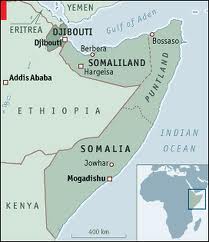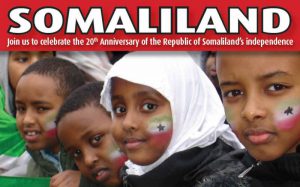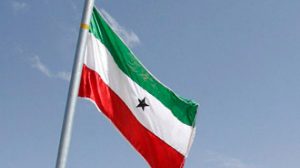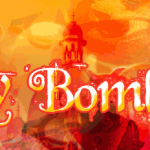Somaliland Independence?
Somaliland is an unrecognized self-declared de facto sovereign state, rather it is internationally recognized as an autonomous region of Somalia.

The government of Somaliland regards itself as the successor state to the British Somaliland protectorate, which was independent for a few days in 1960 as the State of Somaliland before uniting with the Trust Territory of Somalia (the former Italian Somaliland) later the same week to form the Somali Republic. (http://en.wikipedia.org/wiki/Somaliland)
From 1988-91 the collapsing governing regime of(pro-USA) President Mohamad Siad Barre regime (of Somali Republic) became less effective and more totalitarian and committed massacres against the people of Somaliland. These were among the events that led to the Somali Civil War (1991 to present) (Read more: http://en.wikipedia.org/wiki/Somali_Civil_War).
The war has left the economic and military infrastructure severely damaged. After the collapse of the Siad government in 1991, the local government, led by the Somaliland National Movement (SNM), declared independence from the rest of Somalia on May 18 of the same year. Since then, the territory has been governed by a feeble administration that seeks self-determination as the Republic of Somaliland. However, Somaliland’s self-proclaimed independence remains unrecognized by any country or international organization.
Following the outbreak of the civil war and the ensuing collapse of the central government in all of Somalia, residents reverted to local forms of conflict resolution, either secular, traditional or Islamic law. The chaos continues today with competing militias winning and losing territory as well as many lost lives and refugees escaping the war.
There are two governing groups, one in Somalia is officially recognized internationally but has little control beyond the Capital of Mogadishu. The Somaliland government is in place in the city of Hargeisa but has little effect in the area. In October 2011, a coordinated operation between the Somalia military and the Kenyan military began against the intransigent Al-Shabaab group of insurgents in southern Somalia which has been the major destabilizer for almost 20 years in Somalia.
Not surprising for a country ravagged by division and warfare, the legal structure in Somalia is loosely divided along three lines: civil law, religious law and customary law. The judicial system, if it can be called that, is based on civil law which affirms the primacy of Muslim shari’a or religious law, although in practice shari’a is mainly focused on domestic matters such as marriage, divorce, inheritance, and local civil issues.
Included in civil issues of course are laws which govern homosexual activity. It’ s no surprise that homosexuality is illegal in the country and is punishable by imprisonment. Under Article 409 of the Somali Penal Code, introduced in 1973, sexual intercourse with a person of the same sex is punishable by imprisonment from three months to three years. An “act of lust” other than heterosexual intercourse is punishable by a prison term of two months to two years. Under Article 410 of the Somali Penal Code, an additional security measure may accompany sentences for homosexual acts, usually coming in the form of police surveillance to prevent “re-offending”. (http://en.wikipedia.org/wiki/LGBT_rights_in_Somalia)
(1) The following commentary about Somali Culture and Homosexuality comes from the website called SomaliGayCommunity.org
Gay Life of the Somali People
(http://www.somaligaycommunity.org/content/view/13/28/)
Somali Gay Community was established in 2005 by a small group of Somalian guys who, apart from sharing the same culture and background, acknowledge the fact that they are homosexuals living in the UK. The aim of starting the group was to create a space and medium for Somalian gays and lesbians to access information, share experiences and develop support networks.
 “Somali culture is unique and distinctive compared to the rest of the world. The ties and bonds traditionally found in Somali families, which even extended to the whole town or city, is very strong and robust. Despite the current situation, Somalis consider themselves to be one homogenous people and not a nation of multiple cultures or faiths. Therefore having almost the same belief, ideas and way of life.
“Somali culture is unique and distinctive compared to the rest of the world. The ties and bonds traditionally found in Somali families, which even extended to the whole town or city, is very strong and robust. Despite the current situation, Somalis consider themselves to be one homogenous people and not a nation of multiple cultures or faiths. Therefore having almost the same belief, ideas and way of life.
“Somali culture is influenced by a range of factors. Islam, plays a key role in the Somalian way of life. It is the starting point of the Somali family structure and organization, thus homosexuality is considered by many to be fruitless and a mortal sin. However, we at Somali Gay Community do not consider love and respect between two individuals, whether straight or gay, as fruitless. It’s also important to note that some might mistake local customs for religious beliefs, for example women being treated as subservient to men.
“Homosexuality in Somalian communities is as extensive as in any other ethnic community, the only difference is that it’s done in private and secrecy thus not openly visible. Arab and Muslim governments turn a blind eye to homosexual practices as long as it stays in the dark. But conspicuous punishments await those who dare to test the limits of the law. In several occasions when gays came to the open and in case a gay marriage was conducted, they had to face the shame of the community and the hand of law. (Bashir Goth)
“Homosexuality in Somalia and Africa predates European colonization, as sexual relations were said to be common in many cultures especially among young boys. Boys sleeping in the same bed and holding hands in public was a familiar (and beautiful) sight. However when adulthood knocks, they are expected to be married and have families. Wherever you are being gay does not stop anyone from having children or a family. Someone is valued for what they have achieved and done rather than who they are having sex with.
“Gay and Lesbian Somalians who are in Somalia have no official recognition and live under a constant cloud of fear, as homosexuality is often punished with lashing, being ostracized from families and communities and even death! This is not an exaggeration as many of our brothers and sisters have been made to suffer inhumane reprimands or killed.
“Therefore, being Somali and gay can be very difficult. Living secret lives and not sharing your ideas and feelings with those you have close contact with in life is not an easy thing. Many flee their homes to escape possible torture or ‘honor killings’. Some become accustomed to living double lives. Some are out to their families, not necessary by choice. Homosexuality is discussed in Somali households mainly in a negative way. Families tend to know or suspect their gay children but the problem arises when the son or daughter admits to his/her sexuality.
“We would like to see homosexuals in Somalia accepted as equal to anyone one else under the law. It is important for all peoples Human Rights to be acknowledged with dignity and respect. However, it will not realistically take place in the near future. As it was illegal to be gay in the UK only 40 years ago and the law repealing section 28 only came into effect in 2003.”
(2) The following commentary about Somali Culture and Homosexuality comes from the website Behind the Mask, a LGBT news reporting site, 2004
Death Hangs Over Somali Queers
(http://www.sodomylaws.org/world/somalia/sonews007.htm)
By BTM Correspondent, Faro, in Somalia
“The problems for queers in Somalia relate to the lack of a central government, loosely applied Islamic law and pressure from families,” reports one of the leaders of Queer Somalia.
“Faro, is one of the leaders of Queer Somalia, a community based organization based in Addis Ababa, Ethiopia. He makes frequent visits to Somalia to make contact with small groups of queers there and on a recent visit he sent back startling information that shows that for gay and lesbian people in Somalia the issue of death looms large. Whether through suicide due to pressure from families or to severely applied Islamic law that is uncontrolled due to the lack of a central government. Their greatest fear is death, a sentence that can be brought upon them just for being homosexual or being perceived to be homosexual. (photo: Somaliland flag)
 “My people don’t understand what a homosexual is. They only know that through their religious law the solution is to kill. There is no law to protect or help queers in Somalia and Queer Somalia (a community based organization) cannot be public or make demands on the government because there is no government with whom we can talk. The situation for queer people in Somalia is very dangerous.”
“My people don’t understand what a homosexual is. They only know that through their religious law the solution is to kill. There is no law to protect or help queers in Somalia and Queer Somalia (a community based organization) cannot be public or make demands on the government because there is no government with whom we can talk. The situation for queer people in Somalia is very dangerous.”
“Without official recognition and without a government to lobby, Queer Somalia can do little more than report on the plights of individuals and to host meetings with small groups, acting as a link to the outside world.
“There are a lot of people who are queer [in Somalia] but they are afraid they will miss their basic rights if they express themselves. We can say still there is no opportunity to find great numbers of queers.
“On a recent visit to Somalia Faro met with a group in Hargeisa (capital of the Somaliland territory). At the meeting he was able to report back to them on the All Africa Conference, which was held in Johannesburg in February 2004 and which he attended. “They were very glad to meet between us and I passed information about the conference held in South Africa. They welcomed it heartily. They feel they will need help in every aspect of organization later on. The Somali Queers need great help in order to get their rights but our biggest problem is because we haven’t got a central government and effective national laws. However the idea of an East Africa Alliance as part of AARI (All Africa Rights Initiative, founded at the conference) is a surprise and a welcome one to them.
“Young queers in Somalia look to neighbouring countries for help and sanctuary but have difficulty finding it, as both Ethiopia and Kenya do not look favourably on gay issues either. “Two boys, who were placed in an orphanage in Addis Ababa, ran away after pressure from their families. One is now living on the streets in Kenya. All I can do is look for more information on them and try to stay in contact.
“From Mogadishu, Faro learned that if a person comes to know that another person is queer the children and women will kill them. There are secret houses that queers meet at and rooms that they have rented. I contacted one of the Somali queers who is living in Mogadishu but he was afraid while I was talking to him. When they want to meet each other they have great difficulty, sometimes they do wear women’s clothes, which is a veil (hijab) — muslim clothes.
“I communicated with another person that is living in Dhagahbur (a town in eastern Ethiopia) and he told me that he is in bad situation if he doesn’t leave there; he is afraid of death. His family are against him. For many queers in Somalia their greatest worry is their appearance, they have problems coming from their family and that problem is that their family compels them to marry a women and so some commit suicide. This happened to one boy recently in Bosaso, a northern port city in Somali. He killed himself because of the problems he had from his family and normal friends.
“Osmin, another member of Queer Somalia, reported to Faro that in the city of Burao (capital city of the Togdheer province in Somaliland; second largest city in Somaliland after Hargeisa) he witnessed gangs of men with guns searching the streets for people they suspected of being gay. He asked one of the people there who are these men with guns and afterwards was told that these men were looking for men who have been accused of having sexual relations with other men. They said queer men will go to jail and be tried by Islamic law. According to Osmin one of the men was being rounded up simply because he was not married and was considered old enough to have married. He will get at least 100 lashes for that, another man, who was married, will certainly be killed.”
(3) Another report from Somali Gay Community website in which the author (administrator of the website) painfully tries to untangle ‘natural homosexual desire’ from the arcane complexity the Quranic verses. He concludes with “the current position of the Muslim jurists is unsustainable and an open and honest debate about the legal status of homosexuality is paramount.”
(3) The 2010 Human Rights Report from the U.S. Department found that “sexual orientation was considered a taboo topic, and there was no public discussion of this issue in any region of Somali culture.” It also found that “there were no reports of societal violence or discrimination based on sexual orientation.” (http://paei.state.gov/documents/organization/160144.pdf)
This latter statement clearly is in conflict with the preceding reports about the risk of violence, punishment and incarceration that LGBT people face in the country. One has to wonder how the State Department came to its conclusions if the reporters had spoken directly to LGBT people of the Somali society.
Also see:
–http://wikiislam.net/wiki/Persecution_of_Homosexuals
–http://ilga.org/ilga/en/countries/SOMALIA/Law
–http://www.somaligaycommunity.org/content/view/14/29/
–http://www.topix.com/wire/world/somalia
–http://www.somaliaonline.com/community/showthread.php/14154-Somali-gay-community
–http://www.afrol.com/articles/27280
















